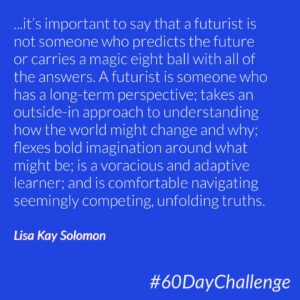 I have to admit, when I use the word futurist, I feel like people conjure up images of someone with a crystal ball predicting what’s in our future. 🔮
I have to admit, when I use the word futurist, I feel like people conjure up images of someone with a crystal ball predicting what’s in our future. 🔮
Education Reimagined posted an interview with two educators who work in the fields of foresight and design: Educators as Futurists: A Conversation with Stanford d.school Leaders.
Foresight is a mindset and educators need to build and exercise this competency.
I really connected with Lisa Kay Solomon’s definition of a futurist and why it’s important for educators to think like futurists:
First, it’s important to say that a futurist is not someone who predicts the future or carries a magic eight ball with all of the answers. A futurist is someone who has a long-term perspective; takes an outside-in approach to understanding how the world might change and why; flexes bold imagination around what might be; is a voracious and adaptive learner; and is comfortable navigating seemingly competing, unfolding truths.
In the context of education, educators who take a futurist’s mindset are looking to cultivate young people as lifelong, adaptive learners, rather than being concerned with teaching what’s immediately measured on a test. From the perspective of an administrator or district leader, it’s about getting comfortable asking bigger questions, such as “What is the role of schools?” and “How might teachers foster and model agency, flexibility, and resiliency?”
Having a futurist mindset means being comfortable that tomorrow might be quite different compared to today based on unfolding trends, patterns, and external signals. It means getting perspectives from multiple sources, being a sense maker, and having a willingness to change a point of view if new information conflicts with what drove past decisions.
And, it also asks: “If we want to help shape the future, and not have the future happen to us, how do we widen our aperture to the kind of information that gives us the contextual intelligence of where the future may be heading?” Once you start to see the future in this way, it’s hard to unsee it.
Lastly, it’s about developing a lens that really values different perspectives that come together in fundamentally interdisciplinary ways, so that we’re not blinded by expertise, but, instead, constantly in a learning mindset.
—–
❓ Provocations:
What parts of Solomon’s words resonated with you? Why is that?
Is being able to think like futurist a new competency for educators, both in and outside the classroom? How might our visions (and our actions) be different if we developed and embraced a futurist mindset?
💎 Resource:
Leaders as Futurists – video of a talk by Lisa Kay Solomon
🧠 Mindsets:
Thinking like a futurist
💡 Areas:
Longview
📣 Drop your thoughts in the comments, or in the Facebook group, and feel free to share resources. 🔥🔥🔥
- A silver lining - January 22, 2022
- Is our use of tech working against us? 🤔 - September 8, 2021
- What’s NOT going to change in the next 10 years? 🤔 - September 7, 2021